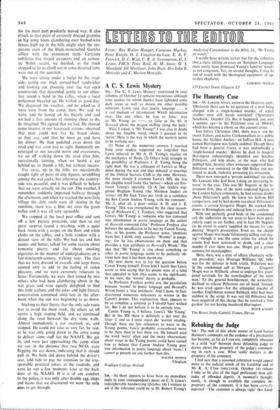A C. S. Lewis Mystery
11,-E7EN5 ITO HI EIDInn From : Rev Walter Hooper, Cameron Mackay. Peter Knight, 0. 1. Vaughan-Jackson, E. A. F. Fenwick, D. C. Watt, C. R. A. Swynnerton, G. S. Lester, FRCS. Peter Reid, H. M. Snow, 0. S. Masefield, Jill Mortimer, John Brett, Drs John B. Metcalfe and E. Marion Metcalfe.
SIR,—The 'C. S. Lewis Mystery' mentioned in your columns of October 14 remains mysterious although your readers (to whom thanks) have lightened some dark areas as well as shown me other possible solutions. Lewis said that 'poetic language . . . is a real medium of information. Which information may, like any other, be true or false: true as Mr Young on —, or false as the bit in Beowulf about the dragon sniffing along the path.'
Who, I asked, is `Mr Young?' I was also in doubt about the illegible word, which I guessed to be `weirs.' Here is the way in which the mystery seems to be working out : (1) None of the numerous answers I received from your readers supported my long-shot that Lewis referred to Mr A. D. Young's treatise on the mechanics of fluids. (2) Others hold strongly to the possibility of Professor J. Z. Young being the right man. He was a colleague of Lewis's at Mag- dalen during the war and they debated at meetings of the Oxford Socratic Club at the time. However, the more closely I examine Lewis's MS, the less the illegible word looks like 'nerves'—which are Pro- fessor Young's specialty. (3) A few readers sug- gested Brigham Young (the Mormon leader) on `wives.' (4) Mr Ivan Yates put forth as a candidate the Rev Canon Andrew Young, with the comment: 'He is, after all, a poet—unlike A. D. and J. Z. Young.' This was strengthened by the clear reason- ing of Professor C. J. Fordyce, who suggested that Lewis's `Mr Young' is 'someone who has conveyed true information in poetic language as the author of Beowulf conveyed false.' Professor Fordyce also believes the specification to be met by Canon Young, who, in his poems, the Professor notes, 'mentions weirs but, I think, only casually. "Worms" is tempt- ing: for he has observations on them and that provides a nice antithesis to Beowulf's Worm.' The idea that `Mr Young' is true about something or other in poetic language seems to be perfectly ob- vious now that it has been shown me.
My next move was to lay the question before Canon Young himself. From him I learnt that Lewis wrote to him saying that his poems were of a kind that appealed to him (this seems to me significant). In his view, the 'worms' theory is probable.
As Professor Fordyce points out, the parallelism between 'worms' in poetic language and Beowulf s Worm forms a 'nice antithesis.' And I have, in fact, discovered numerous references to worms in the Canon's poems. This explanation, then, appears to be as complete a solution as I should have wished for. But I do not believe it to be entirely true.
Canon Young is, I believe, Lewis's `Mr Young.' But in the MS there is definitely a dot over the letter 1' and so I must reject the 'worms' reading. Though there are few references to weirs in the Young poems, Lewis probably remembered more to be there than in fact there are. He himself used the word 'weirs' often and the many observations about water in the Young poems could have caused him to believe that Canon Andrew Young gave true information in poetic language about 'weirs.' I cannot at present see any further than this.
WALTER HOOPER
Chaplain
Wadham College; Oxford






































 Previous page
Previous page